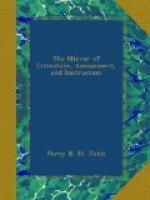These three challenged one another to trials of skill in the imitation of popular authors—they wrote and acted a play together—they got up mock councils, and harangues, and combats, after the manner of the classical heroes of antiquity, and under their names—till, at the age of fourteen, Parr being now at the head of the school, was removed from it and placed in his father’s shop.
The doctor must have found in the course of his practice, that there are some pills which will not go down—and this was one. Parr began to criticize the Latin of his father’s prescriptions, instead of “making the mixture;” and was not prepared for that kind of Greek with which old Fuller’s doctor was imbued, who, on being asked why it was called a Hectic fever, “Because,” saith he, “of an hecking cough which ever attendeth that disease.” Accordingly, Parr having in vain tried to reconcile himself to the “uttering of mortal drugs” for three years, was at length suffered to follow his own devices, and in 1765, was admitted of Emmanuel College, Cambridge. Dr. Farmer was at that time tutor. Of this proficient in black letter (he was one of the earliest, and perhaps the cleverest, of his tribe) we are told by Archdeacon Butler, in a note, that he was a man of such singular indolence, as to neglect sending in the young men’s accounts, and is supposed to have burnt large sums of money, by putting into the fire unopened letters, which contained remittances, conveyed remonstrances, and required answers.
At college Parr remained about fourteen months, when his resources were cut off by the sudden death of his father. On balancing his accounts, three pounds seventeen shillings appeared to be all his worldly wealth; and it has been asserted by one of the many persons who have contributed their quota to the memorabilia of Parr, that had he been aware beforehand of possessing so considerable a sum, he would have continued longer in an university which he quitted with a heavy heart, and which he was ever proud to acknowledge as his literary nursing-mother. It is melancholy to reflect on the numbers of young men who squander the opportunities afforded them at Cambridge, and Oxford, without a thought; “casting the pearl away, like the Aethiop,” while, at the very moment, many are the sons of genius and poverty, who, with Parr, are struggling in vain to hold fast their chance of the learning, and the rewards of learning, to be gained there, and which would be to them instead of house and land. Thus were Parr’s hopes again nipped in the bud, and those years, (the most valuable of all, perhaps, for the formation of character,) the latter years of school and college life, were to him a blank. Meanwhile Dr. Sumner, then master of Harrow, offered him the situation of his first assistant. With this Parr closed; he took deacon’s orders in 1769; and five years passed away, as usefully and happily spent as any which he lived to see. It




